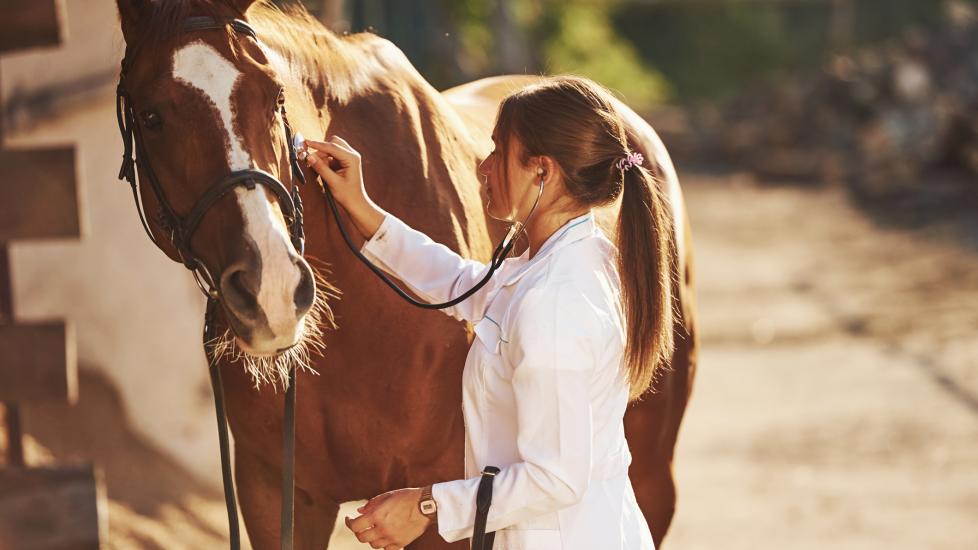Isoxsuprine For Horses
PetMD’s medications content was written and reviewed by veterinary professionals to answer your most common questions about how medications function, their side effects, and what species they are prescribed for. This content shouldn’t take the place of advice by your vet.
What Is Isoxsuprine?
Isoxsuprine is a prescription vasodilator medication to help improve blood circulation. It is used in horses for the treatment of lameness associated with navicular disease, sesamoiditis, and laminitis.
Isoxsuprine has also been used to improve blood flow in small blood vessels in dogs with a rare condition of the nails called Raynaud-like disease and for the treatment of frostbite in birds.
Isoxsuprine is no longer an FDA-approved medication. Isoxsuprine tablets were taken off the market in October 2021 and are no longer commercially available in the United States. However, a reputable veterinary compounding pharmacy may be able to source isoxsuprine powder to compound a formulation as prescribed by your veterinarian.
In certain circumstances, your vet may recommend a compounded formulation of isoxsuprine. Compounded medications are prescribed if there’s a specific reason your pet’s health can’t be managed by an FDA-approved drug, such as if your pet has trouble taking pills in capsule form, the dosage strength is not commercially available, or the pet is allergic to an ingredient in the FDA-approved medication.
Compounded medications are not FDA-approved. They are created by either a veterinarian or a licensed pharmacist on an individual basis to best suit a patient’s particular needs. You can learn more about compounded medications here.
Isoxsuprine Considerations
Isoxsuprine should not be used in horses who have recently given birth, in horses with active bleeding, or in horses who are hypersensitive to ingredients within the medication. Giving Isoxsuprine with certain medications can result in health risks to your animal, so it is important to discuss your animal’s medications, including vitamins and supplements, and medical conditions with your veterinarian.
Safety for this medication has not been established in breeding, pregnant, or nursing horses. Speak with your veterinarian before administering this medication to your horse.
The Association of Racing Commissioners International (ARCI) has designated isoxsuprine as a Class 4 substance. Use of isoxsuprine may not be allowed in certain animal competitions and could result in a Class D penalty. Please check the competition’s rules and regulations before entering your animal while they are taking this medication.
How Isoxsuprine Works
Isoxsuprine is classified as a vasodilator. Isoxsuprine works by relaxing the muscles that line blood vessels, which allows them to widen and improve blood flow.
Isoxsuprine Directions
Follow the directions on the drug label or as provided by your veterinarian.
Isoxsuprine can be given with or without food, but giving it with food can decrease the risk of digestive upset.
Missed a Dose?
Speak with your veterinarian about what to do if you forget to give a dose of isoxsuprine. Generally, they may instruct you to give it when you remember, or if it is almost time for your pet’s next dose, to skip the missed dose and resume your normal dosing schedule. Do not give extra or double doses.
Isoxsuprine Possible Side Effects
Isoxsuprine is generally well tolerated in animals. Side effects are uncommon and may include:
-
Gastrointestinal upset (low appetite, diarrhea)
-
Fast heart rate (tachycardia)
-
Sweating
-
Low blood pressure (hypotension)
Human Side Effects
Isoxsuprine is a prescription medication that is not currently FDA-approved for use in humans.
Due to possible side effects, humans should never use medicine dispensed for their pets and pets should not be given any medicine dispensed for a human’s use.
If you accidentally ingest this medication, call your physician, seek medical care, or call the national Poison Control Center hotline at 800-222-1222.
Call Your Vet If:
-
Severe side effects are seen (see above)
-
Your pet’s condition worsens or does not improve with treatment
-
You see or suspect an overdose
-
You have additional questions or concerns about the use of isoxsuprine
Isoxsuprine Overdose Information
An oral overdose of isoxsuprine is unlikely to cause serious toxicity. Signs of an overdose may include gastrointestinal upset, agitation, nose-rubbing, fast heart rate, fainting, or collapse due to low blood pressure (hypotension).
If you suspect an overdose, immediately contact your veterinarian, seek emergency veterinary care, or call an animal poison control center. Consultation fees often apply.
Pet Poison Helpline (855) 764-7661
ASPCA Animal Poison Control (888) 426-4435
Isoxsuprine Storage
Isoxsuprine should be stored according to the compounding pharmacy’s label.
Keep the container tightly closed in order to protect its contents from moisture and light.
Keep out of reach of children and pets.
Isoxsuprine for Horses FAQs
What is isoxsuprine used for in horses?
Isoxsuprine is used in horses to help improve blood circulation in the treatment of lameness associated with navicular disease, sesamoiditis, and laminitis.
How long does it take for isoxsuprine to work in horses?
It is thought that isoxsuprine takes one to two days of administration for a horse to start feeling better.
How much does isoxsuprine cost?
The cost for isoxsuprine can vary depending on the dosage and frequency schedule your veterinarian recommends, your horse’s individual needs, other medications they may be on, or the issue that initially caused them to be placed on this medication.
No vet writer or qualified reviewer has received any compensation from the manufacturer of the medication as part of creating this article. All content contained in this article is sourced from public sources or the manufacturer.
Featured Image: standret/iStock via Getty Images Plus
References
Lizarraga I, Castillo F, Valderrama ME. An analgesic evaluation of isoxsuprine in horses. Journal of Veterinary Medicine Series A, Physiology, Pathology, Clinical Medicine. 2004;51:370-374.
Mathews NS, et al. Cardiovascular and pharmacokinetic effects of isoxsuprine in the horse. American Journal of Veterinary Research. 1986;47:2120-2133.
Carlotti DN. Claw diseases in dogs and cats. Presented at: World Small Animal Veterinary Association World Congress Proceedings. 2004.
